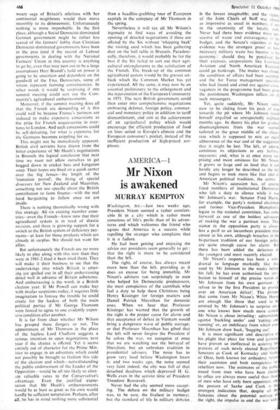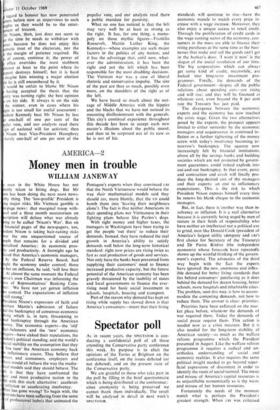AMERICA-1
Mr Nixon is awakened
MURRAY KEMPTON
Washington, D.c.—Just two weeks ago, President Nixon seemed a rather comfort- able fit in a city which is rather more conscious of life's perils than of its adven- tures and which welcomes the friend who agrees that America is a success while repelling the stranger who complains that it is a failure.
He had been getting and enjoying the advice our presidents seem generally to get : that the right is more to be considered than the left.
The right, of course, has always meant more here than the left, providing as it does an excuse for being immobile. Mr Nixon's advisers run surprisingly to men who helped his Democratic predecessors, the most conspicious of the cannibals who feel a duty to help these Christians being Henry Kissinger for foreign matters and Daniel Patrick Moynihan for domestic ones. When we hear that Professor Kissinger has warned that the growth of the right is the proper cause for alarm and that acceptance of defeat in Vietnam would bring a dangerous wave of public outrage; or that Professor Moynihan has gibed that the left will never forgive the President if he solves the war, we recognise at once that we are watching not the betrayal of liberalism, but an unbroken tradition in presidential advisers. The noise has to grow very loud before Washington hears it; and two weeks ago, the noise seemed very faint indeed; the city was full of that detached deadness which depressed H. G. Wells even in the activist time of President Theodore Roosevelt.
Never had the city seemed more accept- ing. The debate on the military budget was, to be sure, the liveliest in memory; but the standard of life in military debates is the lowest imaginable; and the xictory, of the Joint Chiefs of Staff was almosti as impressive as usual in numbers, if not
in the unanimity of the loyalty oath. Never had there been evidence more per. suasive of waste and extravagance in the
budget, and the Senate's rejection of that evidence was the strongest proof of how necessary military waste has become to the economy: should they be penalised for their excesses, corporations like Lockheed Aviation and North American Rockwell could go bankrupt. The matter was closed,' the condition of affairs had been accepted, and the Air Force management specialist who had found and cried out against extra- vagances in the programme had been given the punishment Washington inflicts on all' such messengers.
Yet, quite suddenly, Mr Nixon seems now to be sliding from his peak of ease towards the pit where Mr Johnson found himself engulfed so unexpectedly eighteen months ago. In theory his plan for gradual disentanglement from the war seemed tailored to the great middle of the electo- rate which is supposed to mix an equal abhorrence of the war and of the suggestion that it might be lost. The left, of course, continues its objections to any halfway measures; and, what is at once more sur- prising and more ominous for Mr Nixon. it grows so large and so loud that it can hardly any longer be described as the left and begins to look more like that idol of American political tradition, the centre.
Mr Nixon's accession has, of course, freed numbers of institutional Democrats who felt a duty to silence while it was Mr Johnson's war. Senator Fred Harris, for example, the party's national chairman and former Vice-President Humphrey's legate to the national committee, has come forward as one of the boldest advocates of making the war a partisan issue. That stance in the opposition party is always less a peril to an incumbent president than unrest in his own, although breaches in the bi-partisan tradition of our foreign policy are quite enough cause for alarm. But there has been added the defection of the youngest and most recently elected.
Mr Nixon's response has been a with- drawal to language markedly like that used by Mr Johnson in the weeks before his fall; he has even authorised the attri- bution to himself of the precise words of Mr Johnson from his own garrison : 1 refuse to be the first President to preside over an American defeat'. The phrases that come from Mr Nixon's White House are enough like those that used to be emitted by Mr Johnson's to surprise any- one who knows how much more careful Mr Nixon is about intruding: admonitions against 'buckling under' and 'cutting and running' or, an indelicacy from which even Mr Johnson drew back, 'bugging out'. It is most significant and descriptive of his plight that pleas for time and patience have proven so ineffectual in quieting the protests of such newly elected Republican Senators as Cook of Kentucky and Saxbe of Ohio, both known for orthodoxy before their ascension and both conspicious lOf rebellion now. The estimates of the public mood from men who have been elected to office are always more useful than those of men who have only been appointed, and the posture of Saxbe and Cook is the strongest indication that, despite all fantasies about the potential outrageof the right, the impulse to end the war with' It regard to honour has now penetrated rters before now as impervious to such ughts as they would be to the enter- ent of treason.
kir Nixon, then, just does not seem to e the time he needs to withdraw with our, because he does not enjoy this omatic trust of the electorate, nor the r the Margin of patience required. He of course, continue it; the power of office overrides the most stubborn :ctance at least to the point where its upant destroys himself; but it is hard imagine him winning a major election Ile he is still encumbered by it.
would be unfair to blame Mr Nixon having accepted the thesis that the Atry was turning right; the best opinion on his side. It always is on the side the winner, even in cases where his gin is too small for useful assessment : 'dent Kennedy beat Mr Nixon by less n one-half of one per cent of the ular vote, and our analysts read there sign of national will for activism; then Nixon beat Vice-President Humphrey barely one-half of one per cent of the popular vote, and our analysts read there a public mandate for passivity.
What no one has noticed is that the left may very well be at least as strong as the right. It has, for one thing, a mono- poly on those mythic figures—Franklin Roosevelt, Martin Luther King, the Kennedys—whose examples are such major factors in the politics of any nation; and it has the advantage that, until now, what- ever the administration, it has been the right and not the left which has been responsible for the most disabling decisions. The Vietnam war was a case of liberal rhetoric and conservative impulse. The sins of the past are thus as much, possibly even more, on the shoulders of the right as of the left.
We have heard so much about the out- rage of Middle America with the hippies and the blacks that we have not noticed its mounting disillusionment with the generals. This city's continual experience throughout this decade has been to accept each new master's illusions about the public mood, and then to be surprised out of its ease as he is out of his.











































 Previous page
Previous page